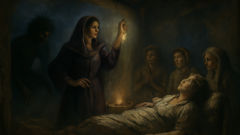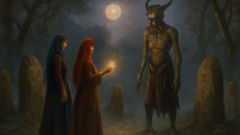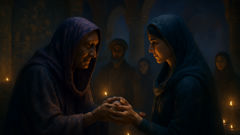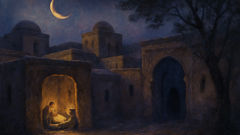Introduction
In the heart of Persia, where the Zagros mountains meet the wide, fertile valleys and the wind carries secrets through cypress groves, a legend endures that chills even the bravest soul. For centuries, whispers about the Al—the demon of childbirth—have drifted from village to village, woven into the lullabies of mothers and the warnings of grandmothers. The Al is not just a tale for dark nights; it is a shadow that has haunted generations, its presence sensed wherever a woman labors to bring life into the world. By day, the villages of the plateau bustle with the vibrant tapestry of life: shepherds guiding their flocks, artisans working copper in smoky stalls, children darting through olive groves. But as night descends and the world slips into stillness, fear coils around homes, and oil lamps burn low beside birthing chambers. It is during these hours—when pain and hope mix—that the Al is said to come, slipping through cracks in mud-brick walls, drawn by the scent of new blood and the vulnerability of mothers. The legend tells of a gaunt, wild-eyed creature, neither fully woman nor beast, with long tangled hair, yellowing claws, and a skirt stitched from the skulls of infants. Her eyes burn with jealousy for what she cannot have: the warmth of family, the sanctity of birth, the love that gathers at a bedside. Some say she was once a woman herself, scorned by the living, her spirit twisted by bitterness into something monstrous. Others believe she is as old as the land—an ancient demon feeding on the boundary between life and death. In this story, the Al finds her match in a young midwife named Shirin, who refuses to let fear govern her village. Armed with wisdom, courage, and an amulet of ancient silver, Shirin faces the creeping terror with only the fragile weapons of faith and love. For in the struggle against darkness, it is not always the sword that triumphs, but the quiet strength of those who stand their ground when all others flee.
Shirin the Midwife and the Gathering Storm
Shirin was the daughter of a potter, born with clever hands and a calm heart. Her mother, who had also been a midwife, taught her the secrets of herbs and the old prayers spoken in breathless moments between contractions. In a village where stories traveled faster than news, Shirin’s skill was her reputation—she’d caught more babies than she could count, her hands steady even when thunder shook the valley.

But that summer, as the apricots ripened and the river ran low, a different kind of fear crept in. Three women had died in childbirth within the span of forty days. The villagers, their faces gaunt with sleeplessness, muttered in corners and eyed their daughters with worry. Each death was the same: a healthy woman, laboring in the cool darkness, suddenly struck by terror and gasping for breath. No wound was found, but their lungs seemed to wither as if snatched by invisible hands. Shirin heard the stories from the grieving families—their voices trembling as they described the strange chill in the room, the scent of sulfur, and the fleeting glimpse of something hunched in the shadows.
One night, as Shirin sat by her mother’s grave pouring out her fears, she felt a cold wind on her cheek. She remembered the old warnings: salt by the door, iron scissors beneath the pillow, a mirror to confuse spirits. But she also remembered her mother’s words: “Demons thrive on fear, my daughter. Show them you are not afraid.” The village wise woman, Bibi Anar, summoned Shirin and handed her a silver amulet—a relic from the Zoroastrian temples, etched with prayers for protection. "The Al comes when hope is weakest," Bibi whispered. "But she fears the light of courage. You must be that light."
As word spread that another birth was near, Shirin prepared herself. The laboring mother, Yasmin, was young and terrified, her husband’s hands trembling as he stoked the fire. Shirin sprinkled salt in every corner and hung the amulet on the headboard. She gathered the village women and made them sing lullabies in unbroken chorus, their voices weaving a barrier of hope. Still, as midnight neared, a shadow thickened in the far corner. A stifling cold filled the room, and Yasmin’s breathing grew labored. Shirin saw a flicker—a tangle of wild hair, eyes like burning coal—lurking behind the tapestry. Her heart hammered, but she refused to look away. She gripped Yasmin’s hand and began the prayer her mother had taught her, voice steady and clear. The Al hissed and drew closer, its claws reaching. With a trembling hand, Shirin held up the amulet, and the demon shrieked, recoiling as if struck by fire. The women’s song swelled. The Al, thwarted, vanished with a howl into the night, leaving a chill that would not fade for days.
Yasmin survived, her baby wailing strong and healthy. The village rejoiced, but Shirin knew this was only the beginning. The Al would not be denied so easily.
Into the Forest of Spirits
The battle with the Al haunted Shirin’s dreams. She saw Yasmin’s ashen face and the demon’s burning eyes, felt the frost that lingered in the house long after dawn. The elders debated whether to send for priests from the distant city, but Shirin was restless. She believed the Al could be defeated, but not by prayers alone. She sought wisdom from every corner—consulting old scrolls in the temple, listening to stories from shepherds who’d glimpsed strange things on moonless nights. At last, she made a decision: she would confront the Al at its source.

The legends spoke of a place deep in the cypress forest—where the veil between worlds was thin and spirits gathered on certain nights. It was said that if one could face the Al there, armed with pure intent and a relic of protection, the demon’s power could be broken. At dusk, Shirin packed a satchel with salt, bread, and her mother’s old prayer beads. She wore the silver amulet close to her heart. Bibi Anar, old but fierce, insisted on joining her, despite Shirin’s protests. “Two hearts are stronger than one against darkness,” she said.
They walked beneath ancient trees whose roots twisted like sleeping serpents. The air grew thick with mist and the scent of wild herbs. Branches creaked overhead, and now and then, eyes flashed in the undergrowth—foxes or djinn, it was impossible to say. As they reached a clearing lit by a sickle moon, Shirin saw a ring of stones blackened by time. She sensed, rather than saw, the presence waiting there. The Al emerged from the shadows: tall and emaciated, her face a mask of longing and hate, her skirt rustling with the clatter of tiny skulls. Her voice was a rasping whisper: “Why do you seek me, midwife? Leave the dead to their peace.”
Shirin steadied herself. “Your place is not among the living. You feed on fear and grief. I will not let you take another mother from us.”
The Al laughed—a sound like wind through grave grass. “You think you can banish me with trinkets and prayers? I am older than your gods.”
Bibi Anar began to chant, her voice rising in a language forgotten by most. The Al advanced, claws gleaming in the moonlight. Shirin flung a circle of salt at her feet and held out the amulet. For a moment, the demon hesitated. “You carry your mother’s courage,” she spat. “But courage is not enough.”
Suddenly, the Al darted forward. The forest erupted in chaos: branches whipping, wind howling, every shadow alive with menace. Shirin and Bibi stood firm, reciting prayers, their voices weaving together until even the wind seemed to pause. The silver amulet glowed, burning bright as sunrise. The Al shrieked and staggered back, her form flickering between woman and beast. She tried to cross the salt, but could not. With a final wail, she dissolved into a swirl of ash and mist, vanishing into the night.
Exhausted, Shirin and Bibi collapsed in the clearing. The forest grew quiet. Above them, stars glimmered through the branches—a sign, they hoped, that the demon’s hold was broken. But as they made their way home at dawn, Shirin knew the world was changed. Evil could be beaten back, but never fully destroyed. It waited, patient as the turning of seasons, testing the courage of each generation anew.
The Return and the Cost of Courage
News of Shirin’s victory swept through the village like spring rain. Mothers hung their heads with relief; fathers brought offerings of bread and pomegranates to Shirin’s door. For the first time in months, laughter returned to the courtyards, and oil lamps burned without fear. But beneath the celebrations, Shirin carried a heavy weariness. She had glimpsed something in the Al’s eyes—a sorrow as old as the world, a hunger that could never be filled.

She found herself drawn to the temple on the hill, seeking answers in old murals and whispered prayers. The priests welcomed her but could not say for certain if the Al was gone for good. “Evil is clever,” they said. “It finds new shapes.” Shirin wondered if her battle had changed the demon, or if it merely slumbered, waiting for another moment of weakness.
The weeks passed peacefully. No more mothers died in childbirth, and Shirin was called to more homes than ever before. She became a legend herself—the midwife who defied a demon. But in quiet moments, she felt watched. Shadows gathered at windowsills and strange dreams haunted her sleep. One night, she woke to a whisper on the wind: “Courage is a light, but every light casts a shadow.”
Shirin realized then that her victory had come at a price. She had gained the respect and gratitude of her people, but she had also become a guardian, forever vigilant against darkness. She would never know rest as she once had; each birth brought both joy and dread. Still, she accepted her burden with grace, remembering her mother’s words: “There is no courage without fear.”
Years later, when Shirin grew old and passed on her amulet to a new midwife, she told her story with honesty. “The Al is real,” she would say. “But so is hope. When we gather our voices and stand together, no demon can break us. Remember: even in the deepest shadow, a single candle is enough to drive the darkness away.”
Thus the legend lived on—not just as a warning, but as a testament to the quiet power of courage, and the unbreakable bonds of community. The Al still haunted stories told by the fire, but she was no longer invincible. For every demon in the world, there would always be those willing to stand in its path.
Conclusion
The legend of the Al endures in Persian villages, not only as a tale of terror but as a reminder that darkness is always part of life’s tapestry. In every birth chamber where mothers labor and loved ones gather, there exists the risk of loss—the thin edge where hope meets fear. Yet, as Shirin’s story shows, true courage lies not in denying fear, but in confronting it with open eyes and steady heart. The Al may never be fully vanquished, but she is kept at bay by the light of compassion and unity. The midwives, mothers, and wise women who resist her do so not with brute strength, but with faith in each other and in the goodness of their community. Through rituals both ancient and humble—salt at the threshold, a song at midnight, a hand held in pain—villagers assert their will to survive and to protect what matters most. Generations after Shirin’s time, her amulet passes from hand to hand, collecting new prayers and stories. In every telling, it becomes clearer: evil is patient and resourceful, but so too is hope. As long as there are those willing to stand together and shine a candle into the shadows, even the oldest demons must retreat before dawn.













